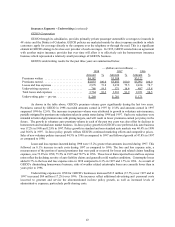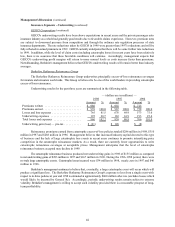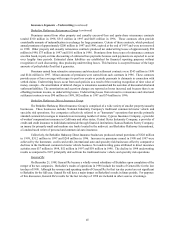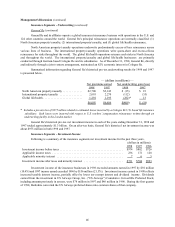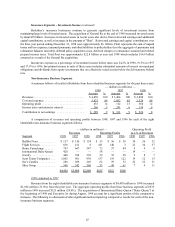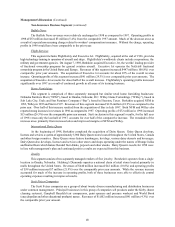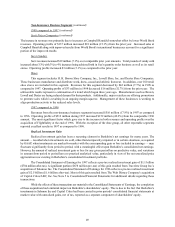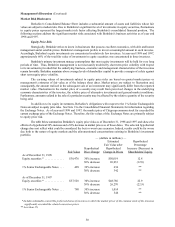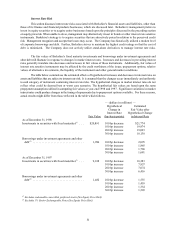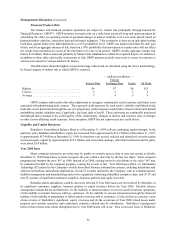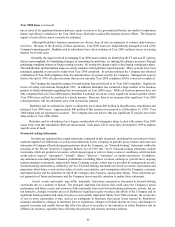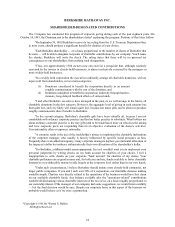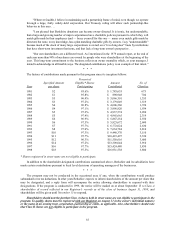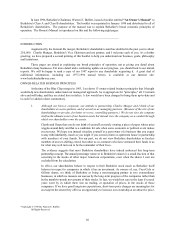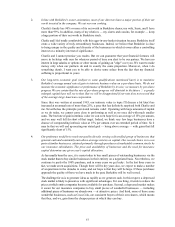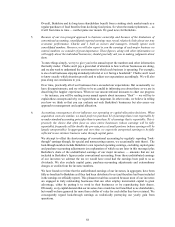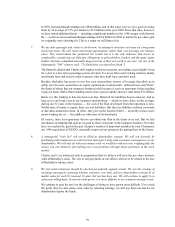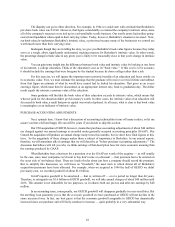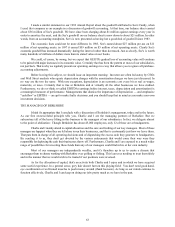Berkshire Hathaway 1998 Annual Report Download - page 54
Download and view the complete annual report
Please find page 54 of the 1998 Berkshire Hathaway annual report below. You can navigate through the pages in the report by either clicking on the pages listed below, or by using the keyword search tool below to find specific information within the annual report.53
Management’s Discussion (continued)
Year 2000 Issue (continued)
one or more of its significant business partners, equity investees or key governmental bodies are unable to implement
timely and effective solutions to the Year 2000 issues, Berkshire could suffer material adverse effects. The financial
impact of such effects cannot currently be estimated.
Although Berkshire’s business operations are diverse, they all rely on computers to conduct daily busines s
activities. Because of the diversity of those operations, Year 2000 issues are independently managed at each of the
Company’s operating units. Berkshire and its subsi diaries have been working on Year 2000 readiness issues in varying
degrees for several years.
Generally, the stages involved in managing Year 2000 issues include (a) identifying the IT and non-IT systems
that are non-compliant, (b) formulating strategies to remedying the problems, (c) making the changes necessary through
purchasing compliant systems or fixing existing systems, (d) testing the changes and (e) developing contingency plans.
The identification and formulation stages are nearly complete at all significant operating units. Many systems have been
purchased, upgraded or corrected to make them Year 2000 compliant. In certain instances the Company has obtained
certifications of Year 2000 compliance from the manufacturers of systems used by the Company. Management expects
that by the end of 1999, all critical systems that are not currently Year 2000 compliant will be corrected or replaced.
The Company has begun the testing of several systems that are believed to be Year 2000 compliant. Significant
levels of testing will continue throughout 1999. In addition, Berkshire has contacted a large number of its business
partners to obtain information regarding their own progress on Year 2000 issues. While all business partners have not
fully completed their own Year 2000 projects, Berkshire is currently not aware of any significant business partner whose
Year 2000 issues will not be resolved in a timely manner. However, there is no assurance that significant Year 2000
related problems will not ultimately arise with its business partners.
Berkshire and its subsidiaries expect to ultimately incur about $60 million in identification, remediation and
testing of Year 2000 issues. Approximately $40 million of this amount was incurred as of December 31, 1998. Year
2000 related costs are expensed as incurred. The Company does not believe that any significant IT projects have been
delayed due to Year 2000 efforts.
Berkshire and its subsidiaries have begun consideration of contingency plans to deal with certain Year 2000
issues in the event that remediation efforts are unsuccessful. Such plans will be more fully developed in 1999 to address
specific areas of need.
Forward-Looking Statements
Investors are cautioned that certain statements contained in this document, including but not limited to those
under the caption Year 2000 Issues as well as some statements by the Company in periodic press releases and some oral
statements of Company officials during presentations about the Company, are "forward-looking" statements within the
meaning of the Private Securities Litigation Reform Act of 1995 (the "Act"). Forward-looking statements include
statements which are predictive in nature, which depend upon or refer to future events or conditions, which include
words such as "expects", "anticipates", "intends", "plans", "believes", "estimates", or similar expressions. In addition,
any statements concerning future financial performance (including future revenues, earnings or growth rates), ongoing
business strategies or prospects, and possible future Company actions, which may be provided by management are also
forward-looking statements as defined by the Act. Forward-looking statements are based on current expectations and
projections about future events and are subject to risks, uncertainties, and assumptions about the Company, economic
and market factors and the industries in which the Company does business, among other things. These statements are
not guaranties of future performance and the Company has no specific intention to update these statements.
Actual events and results may differ materially from those expressed or forecasted in forward-looking
statements due to a number of factors. The principal important risk factors that could cause the Company's actual
performance and future events and actions to differ materially from such forward-looking statements, include, but are
not limited to, changes in market prices of Berkshire's significant equity investees, the ability of the Company and its
significant business partners and equity investees to successfully implement timely Year 2000 solutions, the occurrence
of one or more catastrophic events, such as an earthquake or hurricane that causes losses insured by Berkshire's
insurance subsidiaries, changes in insurance laws or regulations, changes in Federal income tax laws, and changes in
general economic and market factors that affect the prices of securities or the industries in which Berkshire and its
affiliates do business, especially those affecting the property and casualty insurance industry.


